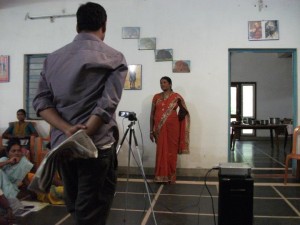 On Saturday 25th August 2012, Video Volunteers began recruitment of new Community Correspondents for the IndiaUnheard program in Chhattisgarh. The program is currently targeting sensitive states where the need for community media as an alternative to the mainstream is matter of urgency.
In February 2012, 18 new correspondents joined IndiaUnheard from the conflict-ridden state of Jharkhand. In the months since, Jharkhand’s unheard voices- people living in some of the most marginalized communities and regions in the state have started making videos that articulate long standing issues and concerns which have put their lives and futures in jeopardy. Multiple and diverse voices have spoken out on the people’s demands and aspirations. These videos have successfully brought about empowerment and in some cases, even, social change. In areas increasingly running out of options, community media has helped the people who were increasingly running out of options, redefine participatory democracy by using video as a tool.
The state of Chhattisgarh was IndiaUnhead's next station. Recruitment manager Radhika was the key person who co-ordinated the entire process. It was the first complete recruitment experience. She shares the details of it, her personal experiences and impressions.
The Preparations
Recruitment of our Community Correspondents is a crucial process that lays the foundation of Video Volunteers’ IndiaUnheard program. The search is to identify individuals across the country who are connected to the people, the land and the issues of their community. We want people who are motivated and keen to learn. People who have the belief that they can bring change and can instil this belief in the hearts and minds of their communities.
The process began in early April when I began to research Chhattisgarh from my desktop in the Goa Office. I was trying to get a sense of the people, the culture and the politics. Soon, I found myself talking with everyone I could connect with in the state - activists, NGO-wallahs, representatives of people’s movements. In a few weeks, I had worked to set up meetings with some of these people who lived across the length and breadth of Chhattisgarh.
The blueprint was ready. Even on a Google Map, I could see that it was going to be a gruelling schedule. I would be covering as many as 23 districts out of a total of 27. I would meet 100s of new faces in place that I had never experienced before. On 11th May 2012, I had packed my bags, ready to go. A taxi was waiting outside my door.
The evening of the next day, I touched down atSwamiVivekanandaAirport,Raipur. The capital reminded of every other city I had seen in the country –impressively modern architecture juxtaposed with the usual dirt & squalor & scruffy dogs going through piles of garbage. In a few hours, I was already reeling from the big city blues and looking forward to travelling the heartlands. I was joined by Video Volunteers Director Stalin K who would accompany me for most of my trip.
The Trip
It was incredible was to see first hand stuff that I had read about. The south of the state spreads out in low rolling hills, lush fields and blinding green forests. It is the domain of the Naxals.
In the north the craggy hills would have made great picture postcards. Only, the mining companies had blasted away most of them away.
Throughout the trip, there was an immediate dissonance in the air that got to me. I had a continuous sense of an uneasy and tense calm. In fact, at times, I found myself hoping that something would jump out of the woods and reveal itself and I could just scream, if only to let out the slow building pressure.
The Stories
On Saturday 25th August 2012, Video Volunteers began recruitment of new Community Correspondents for the IndiaUnheard program in Chhattisgarh. The program is currently targeting sensitive states where the need for community media as an alternative to the mainstream is matter of urgency.
In February 2012, 18 new correspondents joined IndiaUnheard from the conflict-ridden state of Jharkhand. In the months since, Jharkhand’s unheard voices- people living in some of the most marginalized communities and regions in the state have started making videos that articulate long standing issues and concerns which have put their lives and futures in jeopardy. Multiple and diverse voices have spoken out on the people’s demands and aspirations. These videos have successfully brought about empowerment and in some cases, even, social change. In areas increasingly running out of options, community media has helped the people who were increasingly running out of options, redefine participatory democracy by using video as a tool.
The state of Chhattisgarh was IndiaUnhead's next station. Recruitment manager Radhika was the key person who co-ordinated the entire process. It was the first complete recruitment experience. She shares the details of it, her personal experiences and impressions.
The Preparations
Recruitment of our Community Correspondents is a crucial process that lays the foundation of Video Volunteers’ IndiaUnheard program. The search is to identify individuals across the country who are connected to the people, the land and the issues of their community. We want people who are motivated and keen to learn. People who have the belief that they can bring change and can instil this belief in the hearts and minds of their communities.
The process began in early April when I began to research Chhattisgarh from my desktop in the Goa Office. I was trying to get a sense of the people, the culture and the politics. Soon, I found myself talking with everyone I could connect with in the state - activists, NGO-wallahs, representatives of people’s movements. In a few weeks, I had worked to set up meetings with some of these people who lived across the length and breadth of Chhattisgarh.
The blueprint was ready. Even on a Google Map, I could see that it was going to be a gruelling schedule. I would be covering as many as 23 districts out of a total of 27. I would meet 100s of new faces in place that I had never experienced before. On 11th May 2012, I had packed my bags, ready to go. A taxi was waiting outside my door.
The evening of the next day, I touched down atSwamiVivekanandaAirport,Raipur. The capital reminded of every other city I had seen in the country –impressively modern architecture juxtaposed with the usual dirt & squalor & scruffy dogs going through piles of garbage. In a few hours, I was already reeling from the big city blues and looking forward to travelling the heartlands. I was joined by Video Volunteers Director Stalin K who would accompany me for most of my trip.
The Trip
It was incredible was to see first hand stuff that I had read about. The south of the state spreads out in low rolling hills, lush fields and blinding green forests. It is the domain of the Naxals.
In the north the craggy hills would have made great picture postcards. Only, the mining companies had blasted away most of them away.
Throughout the trip, there was an immediate dissonance in the air that got to me. I had a continuous sense of an uneasy and tense calm. In fact, at times, I found myself hoping that something would jump out of the woods and reveal itself and I could just scream, if only to let out the slow building pressure.
The Stories
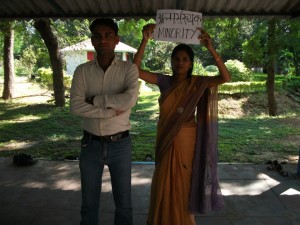 Everywhere I went, I met the people and heard their stories they had to tell. They spoke of atrocities, police brutality, public hearings conducted by the Naxals and constant violence and cruelty. They also spoke of power cuts and lack of water and basic sanitation. In some places, village after village lay abandoned because people have felt unable to deal with the constant pressure of trying to eke out a livelihood amidst violence and apathy.
When I marvelled at the amazing roads or full-to-the-brim canals, I was wryly informed that most of the development and infrastructure in place always benefitted the corporate-industrial complex. All benefits to the common man were exclusively side-effects to the industrial roadshow. When a company wanted to transport iron ore, the government made a fantastic as-good-as-a-national-highway road for them, called it ‘development for all’ and in the process, let the common man use the road as well. Charity, of course, begins with the votebank. What followed was truly interesting-
The damned Naxalites came along. They blew up the road. So the government reacted at once! It facilitated a single rail track simply to carry the ore into Vizag in the neighbouring state of Andhra Pradesh so it could be shipped out. The Naxalites blew that up too. So the government started digging up the fields to install an underground pipeline to transport the slurry.
The villagers protested. But the government duly informed its citizens that only the surface of the land belongs to an individual. If the government wants to dig 6 feet below the surface of the earth, it has every right to. Farmlands were bulldozed, and piles of rubble were left heaped on either side of the pipeline. The only means of livelihood for hundreds of villagers was effectively destroyed.
You would imagine that such a gross violation of rights would make people rise up, protest and rebel, but the state has a very effective system of dealing with most such protests. They label every dissenting voice as a Naxalite. They arrest them on suspicions of sedition. Throw them into jail. Torture them.
I had the pleasure of meeting a very jovial activist who, when he introduced himself from being a resident of such-and-such district, was laughed into silence by his friends and fellow activists. Seeing the confusion on my face, they explained to me that it would be more truthful if he said he belonged to the prison. The gentleman spends almost 9-10 months in jail every year. He is regularly arrested with clockwork precision. His only crime is going to villages and asking people to speak out for their rights.
An Inspiration
Everywhere I went, I met the people and heard their stories they had to tell. They spoke of atrocities, police brutality, public hearings conducted by the Naxals and constant violence and cruelty. They also spoke of power cuts and lack of water and basic sanitation. In some places, village after village lay abandoned because people have felt unable to deal with the constant pressure of trying to eke out a livelihood amidst violence and apathy.
When I marvelled at the amazing roads or full-to-the-brim canals, I was wryly informed that most of the development and infrastructure in place always benefitted the corporate-industrial complex. All benefits to the common man were exclusively side-effects to the industrial roadshow. When a company wanted to transport iron ore, the government made a fantastic as-good-as-a-national-highway road for them, called it ‘development for all’ and in the process, let the common man use the road as well. Charity, of course, begins with the votebank. What followed was truly interesting-
The damned Naxalites came along. They blew up the road. So the government reacted at once! It facilitated a single rail track simply to carry the ore into Vizag in the neighbouring state of Andhra Pradesh so it could be shipped out. The Naxalites blew that up too. So the government started digging up the fields to install an underground pipeline to transport the slurry.
The villagers protested. But the government duly informed its citizens that only the surface of the land belongs to an individual. If the government wants to dig 6 feet below the surface of the earth, it has every right to. Farmlands were bulldozed, and piles of rubble were left heaped on either side of the pipeline. The only means of livelihood for hundreds of villagers was effectively destroyed.
You would imagine that such a gross violation of rights would make people rise up, protest and rebel, but the state has a very effective system of dealing with most such protests. They label every dissenting voice as a Naxalite. They arrest them on suspicions of sedition. Throw them into jail. Torture them.
I had the pleasure of meeting a very jovial activist who, when he introduced himself from being a resident of such-and-such district, was laughed into silence by his friends and fellow activists. Seeing the confusion on my face, they explained to me that it would be more truthful if he said he belonged to the prison. The gentleman spends almost 9-10 months in jail every year. He is regularly arrested with clockwork precision. His only crime is going to villages and asking people to speak out for their rights.
An Inspiration
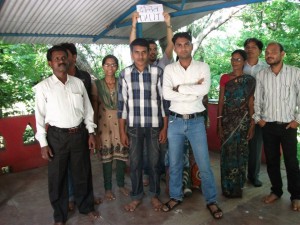 I had the privilege of escaping all these harsh realities while visiting a very inspiring couple. I had spoken to Dr. Jana a few times of the phone from here inGoa, and we’d made the Bengali connect. Despite having very little time, and on my friend and guide Ajay’s advice, we decided to make the 3 hour drive to visit Dr. Jana. His home is beside the hospital he & his wife have been working at for a few decades now.
The story begins in the mid-80s when a pregnant labourer was denied medical care at Bhilai Steel Plant Hospital. She bled to death at the doorstep of the hospital. The labourers decided that it was time they did something. Every single labourer in the vicinity worked over time and laboured day after day pooling together a meagre 20 rupees each for every day until they could finally afford to rent a tiny garage space. When Dr. Binayak Sen saw this space, he and his colleagues, Dr. & Mrs Jana, were so moved that they stayed on, and helped the mine workers set up and manage what has now become the three storied Shaheed Hospital.
Even today, the hospital is funded completely by the people who go there for medical aid, and the management is known to have refused funding offers from big companies or rich people. They know that would mean compromising the pride that people take in calling it “their own”.
The Reasons
I had the privilege of escaping all these harsh realities while visiting a very inspiring couple. I had spoken to Dr. Jana a few times of the phone from here inGoa, and we’d made the Bengali connect. Despite having very little time, and on my friend and guide Ajay’s advice, we decided to make the 3 hour drive to visit Dr. Jana. His home is beside the hospital he & his wife have been working at for a few decades now.
The story begins in the mid-80s when a pregnant labourer was denied medical care at Bhilai Steel Plant Hospital. She bled to death at the doorstep of the hospital. The labourers decided that it was time they did something. Every single labourer in the vicinity worked over time and laboured day after day pooling together a meagre 20 rupees each for every day until they could finally afford to rent a tiny garage space. When Dr. Binayak Sen saw this space, he and his colleagues, Dr. & Mrs Jana, were so moved that they stayed on, and helped the mine workers set up and manage what has now become the three storied Shaheed Hospital.
Even today, the hospital is funded completely by the people who go there for medical aid, and the management is known to have refused funding offers from big companies or rich people. They know that would mean compromising the pride that people take in calling it “their own”.
The Reasons
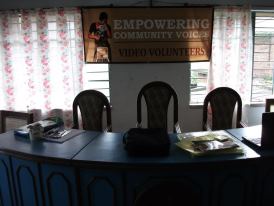 When leaving Chhattisgarh, I was certain of one thing. There is a dire need for the presence of India Unheard there. While I had read about various surveys and reports detailing the number of civilians, security forces & Maoists killed in the last few years, not one mentioned that there have been over 700 deaths on one single road that was built to facilitate the trucks carrying coal for companies. Lack of trained drivers meant tractor drivers took to the wheel, more often than not working overtime to make extra money because they didn’t have fields to live off. The fields now hosted those very same industries they were driving for.
The media splashes pages and pages of IPL controversies, but hardly any mention that schools and hospitals are barely functioning because people are abandoning their homes to escape from the violence and hardships. The spreading industrial stain is slowly strangling the culture, leaving the communities with no space to voice their sorrows.
These are the spaces where the voices of the people need to be amplified. These are the silences where IndiaUnheard will be needed to intervene.
The Community
When leaving Chhattisgarh, I was certain of one thing. There is a dire need for the presence of India Unheard there. While I had read about various surveys and reports detailing the number of civilians, security forces & Maoists killed in the last few years, not one mentioned that there have been over 700 deaths on one single road that was built to facilitate the trucks carrying coal for companies. Lack of trained drivers meant tractor drivers took to the wheel, more often than not working overtime to make extra money because they didn’t have fields to live off. The fields now hosted those very same industries they were driving for.
The media splashes pages and pages of IPL controversies, but hardly any mention that schools and hospitals are barely functioning because people are abandoning their homes to escape from the violence and hardships. The spreading industrial stain is slowly strangling the culture, leaving the communities with no space to voice their sorrows.
These are the spaces where the voices of the people need to be amplified. These are the silences where IndiaUnheard will be needed to intervene.
The Community
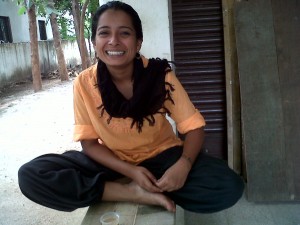 18 new Community Correspondents were trained in Chhattisgarh in August 2012. Radhika sent us this message while she was at the training:
The people we have with us are pretty awesome! 7 women and 11 men of whom 5 are Adivasi, 9 are Dalit, 2 are OBC and 2 from General category. The training has been great so far, the usual fun when a big bunch of people get together.
We've debated on identity, fought about gender, grumbled about food together... We have with us a great group of people - they have spent major parts of their lives as activists for various causes - land rights, adivasi & dalit issues, advocacy & awareness on various schemes, implementation of the same, child rights, women's empowerment, trafficking etc.
I know all of you will really enjoy meeting them.
18 new Community Correspondents were trained in Chhattisgarh in August 2012. Radhika sent us this message while she was at the training:
The people we have with us are pretty awesome! 7 women and 11 men of whom 5 are Adivasi, 9 are Dalit, 2 are OBC and 2 from General category. The training has been great so far, the usual fun when a big bunch of people get together.
We've debated on identity, fought about gender, grumbled about food together... We have with us a great group of people - they have spent major parts of their lives as activists for various causes - land rights, adivasi & dalit issues, advocacy & awareness on various schemes, implementation of the same, child rights, women's empowerment, trafficking etc.
I know all of you will really enjoy meeting them.
Pay By the Cellular Gambling enterprises In britain, Finest Pay By Mobile phone Gambling enterprises
Pay By the Cellular Gambling enterprises In britain, Finest Pay By Mobile phone Gambling enterprises Articles Best Uk Online casino games What are the Almost every other Certificates An excellent Uk Gambling establishment Can have To Getting Courtroom? Faqs For the Greatest Cellular Casinos In the uk The most popular...
Impact Story
The happiness that comes with an yearly bonus
This video is a story of success, a story of a small win against a giant corporation. A story of persistence and a never-say-die attitude. This year, the workers of 3 gardens in the Alipurduar area of Kumargram Block, received a slightly increased yearly bonus, an increase of 3%, from...

